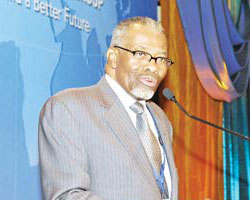The Islamic Development Bank (IDB) is not affected so far by the financial crisis engulfing the world, declared Dr. Ahmed Mohamed Ali, IDB President during the reception/lunch, which he hosted for the IDB Governors and heads of international and regional financial institutions alongside the annual meeting of the World Bank/IMF in Washington DC.
During the event Jacques Diouf, the Director-General of the Food and Agricultural Organization of the United Nations (FAO), the keynote speaker of the event, commended efforts of IDB to tackle the global food security crisis.
“I should like to thank the Bank for its interest in agriculture and for its actions to mobilize resources to deal with the food crisis,” he said. Diouf described the US$1.5 billion food initiative announced by IDB, under the Jeddah Declaration, during its annual meeting in June as an, “exemplary initiative which will help increase production and improve living conditions of many farmers in the developing countries.” The FAO Director-General expressed his pleasure that IDB is adopting a long-term strategy for sustainable development of agriculture in its member countries based on three initiatives taken by IDB: the US$1.5 billion Jeddah Declaration, the US$10 billion Islamic Solidarity Fund for Development (ISFD) to combat poverty and the US$4 billion Special Program for the Development of Africa (SPDA).
IDB initiatives in this respect will help refocus attention of development institutions on the agricultural sector. He noted that the past three years have witnessed a marked increase in food prices and that by last August it was 26% above its level a year earlier. As a result total food imports bill amounted to US$820 billion last year that could jump to US$1.035 billion this year. This represents a 26% increase globally and 25% for developing countries. Moreover, public aid to agriculture fell to US$3.4 billion in 2004 from US$8 billion in 1984, which represents a 58% percent drop. Accordingly the international and regional financial institutions have posted a sharp decline in resources for an activity that is the main livelihood for 70% of the world’s poor. The second major speaker at the IDB reception/luncheon, Lennart Bage, President of the International Fund for Agricultural Development (IFAD) said that there is a need to bolster the level of commitment so as to increase productivity growth from 1-2% currently to 3-5% so as to be able to meet demand and feed the people. He expressed his pleasure at the activities undertaken by IDB noting that both institutions are active in the same member countries. The last major speaker was Gerard Lyons, Chief Economist and Head of Global Research at Standard Chartered Bank, who spoke about the current financial crisis and its impact on emerging market countries, pointing out that the way forward is to get the fundamentals right and sound and that the challenge before emerging markets is how to turn their high savings into investments.










